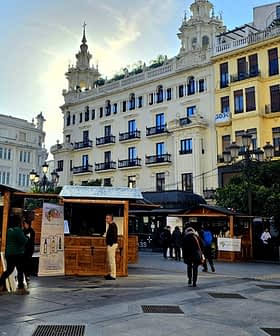Jill Myers is on a mission to promote the role of women in olive growing and olive oil production.
“My journey with extra virgin olive oil began in Italy in 2014, sparking a passion that led to my becoming a sommelier through the Olive Oil Times Education Lab and the International Culinary Center,” Myers said. “This experience connected me with global extra virgin olive oil experts.”
Women tend to hold on to the culture and heritage and teach children the recipes and secrets, which then are passed down from generation to generation. They are essentially the custodians of agro-wisdom.
Thereafter, she imported extra virgin olive oil from female-led producers, judged international competitions and became a respected field expert, focusing on supporting women in the industry.
When the Covid-19 pandemic shut down daily life in her hometown of Charlottesville, Virginia, in 2020, Myers used her spare time to think of how better to connect with the many women she had met across the olive oil world.
See Also:Pandolea Celebrates Its 20th Anniversary in Rome“This was a time when we were all stuck at home, and I built this platform [Women in Olive Oil] to promote communication for women in the sector, to work with each other and support each other,” she said.
The Women in Olive Oil [WiOO] platform has helped to reinforce a larger network of women in the sector, bringing together similar platforms, including the Arab Olive Oil Women’s Network, Pandolea, Donne dell’Olio and Women and Olives LATAM.
“The network now brings together around 3,000 women from 50 countries that represent a wide range of professions within the olive oil industry, from farmers, mill managers, researchers and chemists to retailers, importers, exporters, distributors, marketers, soap makers, artists, authors and chefs,” Myers said.
One of the goals of the network is to promote female-owned brands and companies in a sector that men had traditionally dominated.
While olive oil sector-specific data are hard to come by, women represent about 43 percent of the global agricultural workforce.
“For example, one of the women in our network, a retailer, intentionally buys and sells women-made olive oils only,” she added. “And more retailers are sourcing female-owned olive oils. It’s also a great network for marketing female-owned brands.”
Although the olive oil sector is still largely male-dominated, experts believe the work of female olive farmers is not always accounted for in official statistics.
According to Myers, women are instrumental in passing down the knowledge of the olive oil-making process to the next generation.
“Women tend to hold on to the culture and heritage and teach children the recipes and secrets, which then are passed down from generation to generation,” she said. “They are essentially the custodians of agro-wisdom.”
Myers has seen how women in France, Jordan, Portugal and Turkey preserve traditional olive farming and oil production techniques.
“Mothers teach their daughters to hand-pick olives,” she said. “While in Jordan, the Arab Olive Oil Women’s Network led school workshops on sustainable olive cultivation.”
“Emmanuel Dechelette presides over an olive oil competition, Olio Nuovo Days, judged by children,” Myers added. “She teaches them to discern high-quality extra virgin olive oil, instilling an appreciation for this craft. These moments show women’s crucial role in nurturing the next generation’s respect for olive oil tradition.”
In her efforts to promote the role of women in the olive oil sector, Myers has been working with the International Olive Council.
In 2022, she met executive director Abdellatif Ghedira to discuss opportunities for collaboration.
“Moving forward, entities like the IOC could collaborate with various industry groups to provide educational workshops and seminars on policy and women’s roles in the olive oil industry,” Myers said.
“Women in the sector could establish mentorship programs in partnership with professional networks, women’s business organizations and agricultural groups, aligning with the IOC’s initiatives for industry development,” she added.
In November, the role of women in the olive oil sector took center stage at the IOC’s World Olive Day celebration.
Myers said World Olive Day served as an opportunity for the wider network of associations to discuss these policies while underlining the importance of women in the sector.
“Women have always been deeply involved in managing the olive oil value chain,” Imene Trabelsi Trigui, the head of the IOC’s promotion department, told Olive Oil Times in a November 2023 interview. “Thanks to their knowledge and experience, they play a crucial role in developing this important field and significantly impact current and future generations.”
Looking ahead to 2024 and beyond, Myers plans to organize more networking events, working with various organizations to create connections for women with industry leaders.
“Conducting awareness campaigns on the role of women in policy-making, partnering with non-governmental organizations and advocacy groups, leveraging the IOC’s global platform for broader impact is also important,” she said.
“We should also consider implementing leadership programs for women, involving academic institutions, and tapping into other organizations with aligned interests and other industry experts,” Myers added.
Part of this will require working within higher education and research institutes to study the role of women in the sector and guide promotional policies with data.
“Finally, we could look to offering scholarships and grants for women in partnership with educational foundations and philanthropic organizations,” she said. “[We could also] highlight success stories, collaborating with media networks and leveraging partnerships like those with the IOC for wider visibility.”
With WiOO set to turn four later this year, Myers hopes the organization and its many local counterparts will continue to gain support and amplify women’s voices.
“I hope for more support. For instance, having more women voiced in policymaking,” Myers concluded. “It is important to recognize the potential of women. So far, the collaboration and knowledge sharing in our network has created positive spillover effects into other industries, including health and beauty.”









